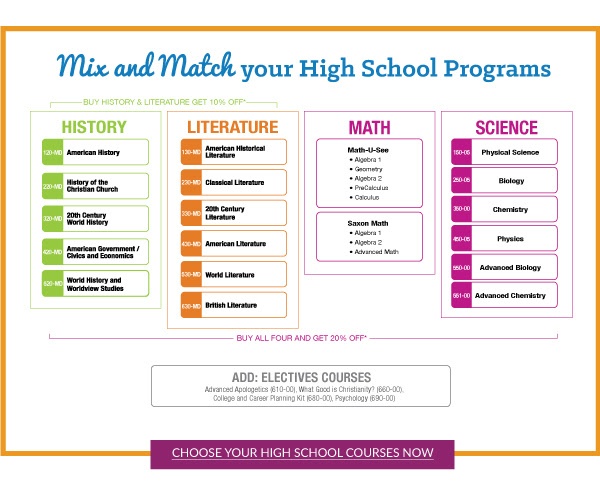
Homeschool doesn’t last forever!
It's a sentiment which has the potential to wring the heart of any homeschool parent, even those who are still in the early stages, wondering if adding and subtracting are ever going to click.
They will.
And someday the kids who repeatedly misspelled school will be all grown up and graduated—moving away from home, heading off to college and careers, marriages, and all manner of grown-up life.
Someday, your homeschooled high-schooler will graduate. Besides using a curriculum that teaches them the reading, math, writing, and science they need, how else can you ensure that your kids are best prepared for life beyond homeschool?
Here are crucial life skills to make sure you cover with your teens before high school graduation. Be sure to consider these when you create a homeschool high school plan.
1. Personal Finance Skills
Your teen should have some experience with handling a personal budget and managing their finances at this point in life, but the stakes are higher when, post-graduation, they begin seeking further education or move out on their own. For most young people, this is the first time that the amounts of money that they are managing begin to number in the thousands of dollars. This is when young adults often begin paying all or a great amount of their own living expenses, from groceries and rent to insurance.
Being able to make both big and small financial decisions that are in line with their own values is crucial to starting adulthood strong. Far too many twenty- and thirty-somethings in my own generation look back on their early adult years and wish they had made different choices.
Have meaningful conversations about finances throughout their high school years and give them the tools they need to make wise decisions.
During their teen years, consider having your student watch as you file taxes, pay bills, and create the family budget. Discuss how your values and financial goals influence your decisions for spending. Talk about the vocabulary surrounding savings accounts, retirement funds, and credit cards.
Personal Finance Discussion Starters for Teens
One of the best ways to make sure that your teens are prepared to handle real-world finances is to have open discussions about money and financial choices. Here is a list of discussion starters:
- What are your career goals? What further education, if any, will be necessary to achieve those goals? How do you plan to pay for this education?
- Are you willing to take out a loan to complete college if it is necessary? Are there alternative ways to get such a degree without going into debt?
- What are you willing to get into debt for? For example, are you comfortable with taking out a loan on a car?
- Do you know how to check your account balances?
- Do you know how to check your credit rating and how to freeze your credit?
- What is more important—attending a specific college or finding an affordable college?
- Are you comfortable filing your own taxes? What are the possible consequences to errors on a tax return?
- How do your values influence your daily spending, your giving, and your long-term saving?
2. Strong Communication Skills
Your homeschooled student needs to be comfortable with receiving a phone call from a stranger and making one. This seemingly small task is one that has become a foreign experience in the generation that was raised with texting and social media! But there are still many times in grown-up life when you must make a phone call—to set up a job interview, to deal with a utility bill, or when you have a concern about your health insurance.
Phone calls are just one aspect of the wider range of strong communication skills that are needed to prepare your teen for life after graduation. Clear email communication plays a key role in many, if not most, careers, and it’s also important to develop confidence in face-to-face communication with people of any generation and background.
Communication Life Skills Discussion Starters for Teens
As you seek to help your homeschooled student improve their communication skills, discuss these topics:
- How does the manner in which you talk to a stranger display your values?
- How would you respond if a person at work was rude and disrespectful to you? Would your response be different based on whether the person was a customer/client, a boss, or someone lower in rank than you?
- What communication strategies can you use to respectfully defuse tension during a difficult conversation?
- What types of professional situations would be better addressed in a face-to-face meeting? Which would be better addressed via email or phone call?
3. Household Skills
There’s no reason for the “bachelor apartment” phenomenon to exist, among young men or women. If your teens are equipped with the skills they need to maintain their homes, prepare nutritious meals, and keep their vehicles in safe working order before they leave the nest, then you won’t have to worry about becoming that parent of urban legend whose college student mails clothing back home to be laundered.
During the older teen years, when your kids often become busier outside the home with jobs, extracurriculars, and friends, it can become harder to enforce regular chore duties. But in spite of how busy schedules can become, making sure that your teens have adequate opportunity to practice and improve their household skills will prepare them to balance the maintenance of a home, yard, and vehicle while working full-time and raising their own families.
Household Life Skills Discussion Starters for Teens
- How comfortable are you with doing a routine car maintenance and safety checks on a vehicle before embarking on a long road trip (checking oil, tire pressure, etc.)?
- Given your financial situation and location, what types of car maintenance jobs make more sense to perform at home? Which jobs are better handed off to professionals?
- How can you best balance concerns regarding health, budget, and time when it comes to meals?
- What types of home repairs can you learn to do yourself? When should you call a plumber or electrician?
- What does the cleanliness of your living space reflect about your values and respect for other people who live in or visit their home?
4. Emotional Skills
The ability to gracefully handle the stress of adult life will be crucial for your children as they begin to leave home. There are countless intimidating first times ahead of them. Does your teen know where to turn when they feel overwhelmed with a new responsibility or situation?
Emotional Skills Discussion Starters for Teens
- What are healthy ways to approach conflict in personal and professional relationships? What types of rhetoric should be avoided when arguing with someone you want to maintain a relationship with?
- What healthy coping skills help most when you are faced with stressful life situations that you cannot control? Which are not effective?
- In relationships, are you able to recognize signs and signals of manipulation, control, unhealthy dependence, or abuse? How do you foresee responding to the end of a romantic relationship?
- What people in your life do you trust most when you need to discuss difficult situations?
- What role can forgiveness play in recovery from emotional wounds?
- What assets do you have in your toolbox to combat anxious thoughts?
- What responses to difficult seasons are you going to decide are “not an option” for you? (I.E. quitting a job without a backup plan, causing physical harm to self or others, etc.)
At these later stages of homeschool, it's time to move beyond simple physical skills into critical thinking, discussing why and how to apply the skills you’ve taught them. This is a key season as we seek to train the hearts and minds of our children. We pray they approach their own lives mindfully, rather than merely operating on auto-pilot or following the crowd of peers.
For homeschooling high school with Sonlight, you have a variety of options. Mix-and-match courses to offer you maximum flexibility!











we're teaching our lad how to maintain the car and fix things around the house. It's good to do. :)